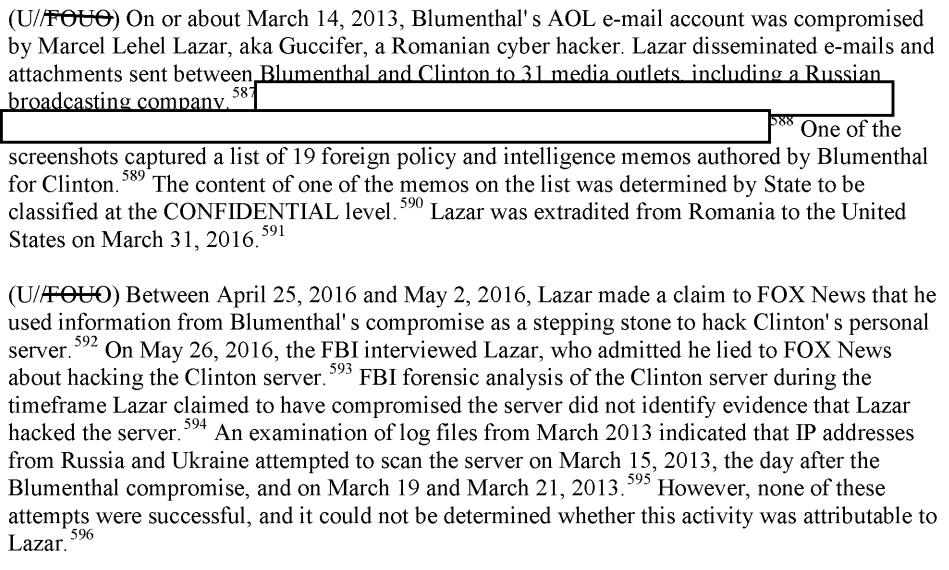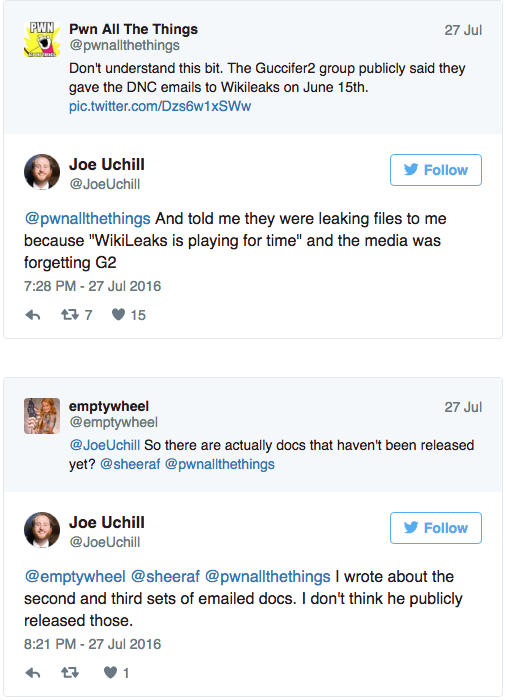NYT Does Not Have the Smoking Gun on Trump Campaign Email Knowledge
The NYT had a complex story today, reporting three things:
- The counterintelligence investigation into the Trump campaign followed from a drunken conversation George Papadopoulos had in May 2016 with Aussie Ambassador to the UK, Alexander Downer
- Papadopoulos was more influential than Trump’s team has made out
- Papadopoulos pitched an April 2016 Trump foreign policy speech as a signal to Russia that Trump would be willing to meet
It’s the first detail that has attracted all the attention. NYT reported it this way:
During a night of heavy drinking at an upscale London bar in May 2016, George Papadopoulos, a young foreign policy adviser to the Trump campaign, made a startling revelation to Australia’s top diplomat in Britain: Russia had political dirt on Hillary Clinton.
About three weeks earlier, Mr. Papadopoulos had been told that Moscow had thousands of emails that would embarrass Mrs. Clinton, apparently stolen in an effort to try to damage her campaign.
Exactly how much Mr. Papadopoulos said that night at the Kensington Wine Rooms with the Australian, Alexander Downer, is unclear. But two months later, when leaked Democratic emails began appearing online, Australian officials passed the information about Mr. Papadopoulos to their American counterparts, according to four current and former American and foreign officials with direct knowledge of the Australians’ role.
[snip]
Not long after, however, he opened up to Mr. Downer, the Australian diplomat, about his contacts with the Russians. It is unclear whether Mr. Downer was fishing for that information that night in May 2016. The meeting at the bar came about because of a series of connections, beginning with an Israeli Embassy official who introduced Mr. Papadopoulos to another Australian diplomat in London.
It is also not clear why, after getting the information in May, the Australian government waited two months to pass it to the F.B.I. In a statement, the Australian Embassy in Washington declined to provide details about the meeting or confirm that it occurred.
NYT’s story does pose a good question: why the Australians didn’t tell the US about this conversation until July, after Wikileaks started releasing DNC emails.
But the few GOPers who have responded to this news raise another question: did the Aussies even know what emails Papadopoulos was talking about?
As I noted in October, we actually don’t know what emails Joseph Misfud was talking about when he told Papadopoulos the Russians had dirt on Hillary. Trumpsters are now suggesting these emails might be those Guccifer 1.0 stole from Hillary, but they could be a range of other emails.
This story would be far more damning if the NYT knew for sure that the emails were ones freshly stolen from DNC, John Podesta, or the Hillary campaign itself, but they don’t.
The uncertainty about what emails Papadopoulos learned about — and revealed to Downer — might explain why the Aussies didn’t tell the US right away. If the Australians didn’t know what emails the Russians had, it might explain their lack of urgency. If the emails were known Guccifer 1.0 emails, it wouldn’t be news. But it doesn’t explain why the Aussies didn’t tell the US in June, when Guccifer 2.0 started releasing documents, but instead waited until their own citizen, Julian Assange, started releasing some on July 22.
All this could be a lot more easily explained if we knew the one detail the NYT admits it didn’t confirm: whether and when Papadopoulos told the campaign that the Russians had emails (and whether he knew which emails the Russians had).
In late April, at a London hotel, Mr. Mifsud told Mr. Papadopoulos that he had just learned from high-level Russian officials in Moscow that the Russians had “dirt” on Mrs. Clinton in the form of “thousands of emails,” according to court documents. Although Russian hackers had been mining data from the Democratic National Committee’s computers for months, that information was not yet public. Even the committee itself did not know.
Whether Mr. Papadopoulos shared that information with anyone else in the campaign is one of many unanswered questions. He was mostly in contact with the campaign over emails. The day after Mr. Mifsud’s revelation about the hacked emails, he told Mr. [Stephen] Miller in an email only that he had “interesting messages coming in from Moscow” about a possible trip. The emails obtained by The Times show no evidence that Mr. Papadopoulos discussed the stolen messages with the campaign.
NYT makes clear Papadopoulos (who was, after all, remote and traveling a lot) primarily communicated via emails. But the emails they obtained (but didn’t share) don’t include any evidence of him telling the campaign about the emails (much less which ones they were).
Which brings us to a point I made in November: when the FBI arrested Papadopoulos in July, they believed he lied to hide whether he told the campaign about the emails, but they de-emphasized that detail in the October plea deal.
[T]he description of the false statements makes the import of them far more clear (import that the Special Counsel seems to want to obscure for now). Papadopoulos lied about the circumstances of his conversations with Mifsud — the FBI appears to have believed when they arrested him in July — as part of a story to explain why, after having heard about dirt in the form of thousands of emails from Hillary, he didn’t tell anyone else on the campaign about them. Laid out like this, it’s clear Papadopoulos was trying to hide both when he learned about the emails (just three days before the DNC did, as it turns out, not much earlier as he seems to have suggested in January), but also how important he took those emails to be (which in his false story, he tied to to a false story about how credible he found Mifsud to be).
FBI found those lies to be significant enough to arrest him over because they obscured whether he had told anyone on the campaign that the Russians had dirt in the form of Hillary emails.
To be sure, nothing in any of the documents released so far answer the questions that Papadopoulos surely spent two months explaining to the FBI: whether he told the campaign (almost certainly yes, or he wouldn’t have lied in the first place) and when (with the big import being on whether that information trickled up to Paul Manafort and Jared Kushner before they attended a meeting on June 9, 2016 in hopes of obtaining such dirt).
I’m sure that’s intentional. You gotta keep everyone else guessing about what Mueller knows.
The NYT’s sources are described as “four current and former American and foreign officials with direct knowledge of the Australians’ role,” though this statement — and a past willingness on behalf of Papadopoulos’ fiancée to provide details and emails — suggests that people close to Papadopoulos cooperated as well: ” Papadopoulos’s lawyers declined to provide a statement.”
The point being, we still don’t have the most important detail of this story: whether Papadopoulos told the campaign about the emails, but more importantly, what the emails were.
Thus far, everyone seems intent on withholding that detail.




